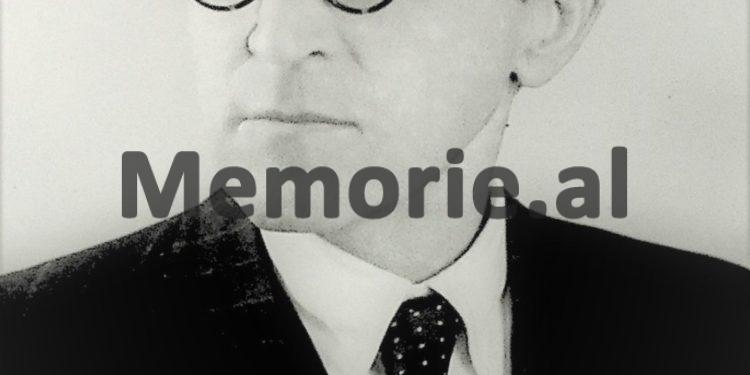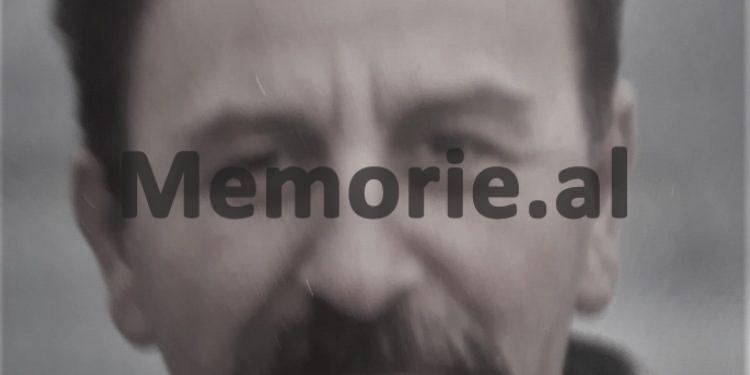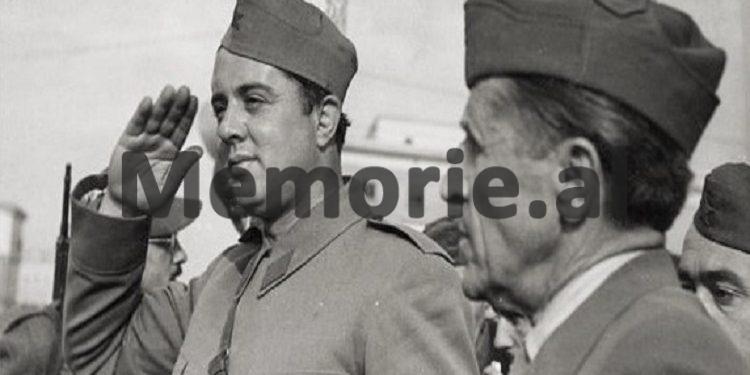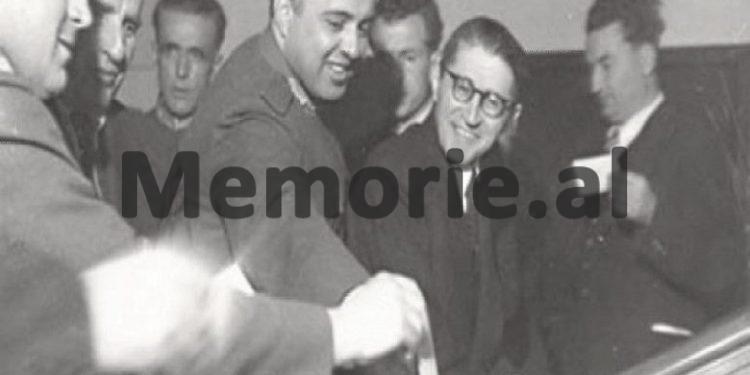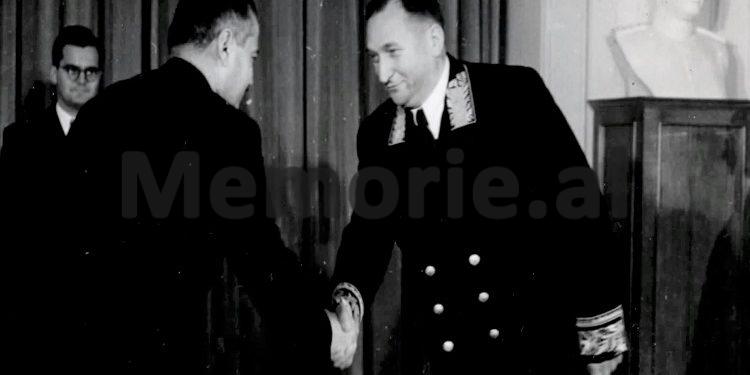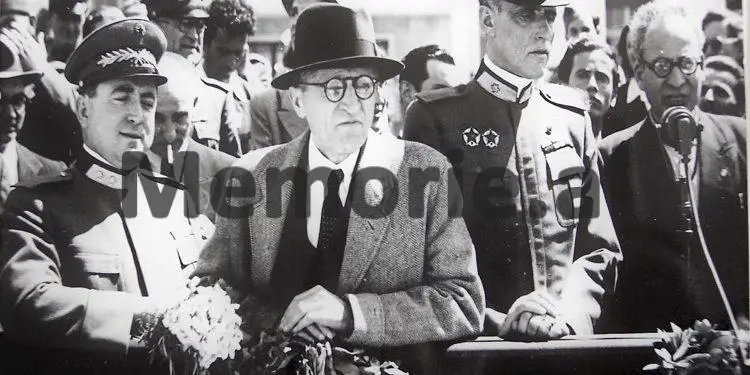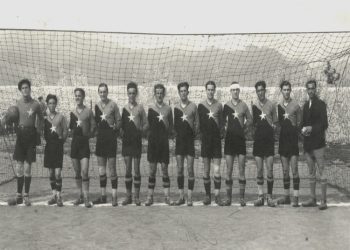By Bashkim Trenova
Part forty
Memorie.al publishes the memoirs of the well-known journalist, publicist, translator, researcher, writer, playwright and diplomat, Bashkim Trenova, who after graduating from the Faculty of History and Philology of the State University of Tirana, in 1966 was appointed a journalist at Radio- Tirana in its Foreign Directorate, where he worked until 1975, when he was appointed journalist and head of the foreign editorial office of the newspaper ‘Zeri i Popullit’, a body of the Central Committee of the ALP. In the years 1984-1990, he served as chairman of the Publishing Branch in the General Directorate of State Archives and after the first free elections in Albania, in March 1991, he was appointed to the newspaper ‘Rilindja Demokratike’, initially as deputy / editor-in-chief and then its editor-in-chief, until 1994, when he was appointed to the Ministry of Foreign Affairs with the position of Press Director and spokesperson of that ministry. In 1997, Trenova was appointed Ambassador of Albania to the Kingdom of Belgium and to the Grand Duchy of Luxembourg. Unknown memories of Mr. Trenova, starting from the war period, his childhood, college years, professional career as a journalist and researcher at Radio Tirana, the newspaper ‘People’s Voice’ and the Central State Archive, where he served until the fall of the communist regime of Enver Hoxha, a period of time when he in different circumstances met many of his colleagues, suckers of some of the ‘reactionary families’, etc., whom he described with a rare skill in a book of memoirs published in 2012, entitled ‘Enemies of the people’ and now brings them to the readers of Memorie.al
Continued from the previous issue
WITH “HEROES OF THE PEOPLE”
POLITICAL BUREAU AND THE PRESIDENCY
In 1991, Haxhi Lleshi called for a civil war and for the protection of the figure of Enver Hoxha!
Haxhi Lleshi says: “According to the canon of the highlands, I do not feel myself in blood with anyone; I have no right to take, nor blood to wash”. What about the bloodshed in Albania after the War, what about the betrayed ideals, what about the comrades killed by comrades in the trenches of the Antifascist War or in secret cliffs, for those whose graves are neither known nor found, who will answer , who is in the blood according to the canon if not Enver and his collaborators ?!
Haxhi Lleshi did not welcome the democratic changes in Albania either. He did not even remain indifferent in his deep old age. Haxhiu called to take up arms and to shed again the Albanian blood, the blood of the students, of the people who had risen to overthrow the dictatorship. At a time when the call “Enver-Hitler” was ringing all over Albania, he inspired the “Enver volunteers”, who were organized in armed units, to defend the dictatorship, the name and the work of Enver Hoxha! He called for civil war.
In my opinion, Haxhi Lleshi was a hero in the years of the Anti-Fascist National Liberation War. He became a shy lake of dictatorship after the war. He can be the portrait of the degradation of a hero coming down from the mountains to then take advantage of the privileges of life provided by power, asking you to turn into a lake. He lived in glory before the bullets of war and was covered with shame by the weight of violent and abused power in peace.
Haxhi Lleshi was the president or the second chairman of the Presidium of the People’s Assembly. The first president, elected on January 12, 1946, was Omer Nishani. He remained in this post until July 31, 1953.
How did I meet the Austrian wife of the former President, Omer Nishani!
I have never met Omer Nishani. I know that in 1916 he left Albania and went to Austria, where he met the Austrian citizen, Rozvita von Voler. I knew Rozvita or Roza in my childhood and youth. Actually I have known Pink Mark. This is what she was called after she married Omer Nishani and after she changed her name from Rozvita to Trëndafile. From Rose, but not from her, I somehow got to know Omer Nishani, his very hectic and contrasting life and his sad ending.
Rose was a poet and writer. In 1933, or 1936, I am not sure; she published in Halle, Germany, the book “Albania, a country coveted by Mussolini.” On April 7, 1939, Albania will be occupied by Mussolini’s troops. As far as I can remember from conversations with him, this book contains several chapters. The first chapter is dedicated to the Albanian national hero Gjergj Kastriot Skenderbeu. The second chapter is dedicated to the legendary pasha of Ioannina, Ali Pasha Tepelena. The third is dedicated to the revolutionary democrat, People’s Hero Avni Rustemi. I am not sure if the book has a fourth chapter, which talks about the King of Albanians, Ahmet Zogu. I know, however, that she did not write positively about Ahmet Zogu and that for this, she was kindly advised to cancel a planned meeting with him.
The Rose has given me, with dedication, the original of a typed chapter of the book “Albania, a country coveted by Mussolini”, dedicated to Skanderbeg. The Albanian translation was done by Robert Schwartz. Maybe she wanted to publish her book in Albania, after the war, so she asked Schwarz for help to translate it. “Albania, a country coveted by Mussolini”, however, was never published in Albanian. This is not because the book had something to be censored, but because the author was isolated from the dictatorship. She had to be forgotten, as her husband, Omer Nishani, had to be forgotten later.
In the chapter dedicated to our national hero, Trëndafile Nishani continues in the footsteps of European literature, which has glorified Gjergj Kastriot. “Who knows what path the history of Europe would have taken,” she wrote in her book. , tried to constantly push forward. “Skanderbeg’s name entered world history covered with glory as it deserved.” It lies not only in the historical role that Skanderbeg played for the fates of our people and Europe, but also in his unparalleled character and virtues. “The pure exemplary life that Skanderbeg led”, writes Trëndafilja, his justice and wisdom, not only towards his people, but also towards the enemies, his deep humanism, made him in the eyes of all bearers of good and nobles”.
Letter from Omer Nishani’s wife from Austria to my mother in ’69!
My first “meetings” with Rozvita or Trëndafile Nishani, I do not remember because they were made when I was still a few months old. It was the War years and my mother was distributing aid to partisan families. In these cases she left me in the safe hands of the Austrian, who never had children. Even in the first years after the war, my mother would ask me to accompany her on occasional visits to Trëndafile Nishani. Rose would often tell me later, how she had once held me in her arms like her son. Even after she left Albania in her old age, from Hamburg on January 26, 1969, she will write to my mother: “If you knew my Ismete – your son Bashkimi has also become my son”. A few months later she will repeat the same thing, writing to me: “Dear Dear Union. I miss the words to say how much I remember you, like your mother. I cannot express my wishes for you. A happy future for you and to serve your beloved homeland always with your pure and rich soul. So and Regards-Roses. June 3, 1969 ”
During the years of the War, Trëndafile Nishani was our neighbor. With the fascist occupation of Albania, Omer Nishani became a member of the State Council. Enver Hoxha in his memoirs says that he stood in this post to help the anti-fascist armed resistance. In the summer of 1943, he left the Council of State and joined the Communist-led Anti-Fascist National Liberation Movement. Omar had previously, in exile, been engaged in leftist, revolutionary movements and maintained links with the Communist International. With Omer leaving Tirana, Trëndafilja was left alone, without any help or livelihood. My mother helped him, as she did for other partisan families in distress. This she would never forget. On March 25, 1968, she will write to me: “No, I will never forget your friendship with an outsider, as I was a jerk, full of love for Albania, which became for me a second homeland. Believe me and I am not ashamed, I will say it in front of the world, I shed many tears leaving you, your country, Albania “. A few months later, in one of the postcards she sent to my mother and me after she left Albania, she wrote: “I have no news from you Ismete, you are my loyalist, from the partisan war when you helped me. Have you forgotten me? If I knew Albanian better, I would have written long letters. If you take dear Bashkim, why do you leave me without knowledge at all? I forgive my mother; I do not forgive you, little one, no matter how tall you are with your body and mind “.
After the War Rose settled with her husband in one of the most beautiful villas in the capital. Immediately after the war, Omer became the Minister of Foreign Affairs of Albania and then, as I mentioned, he was elected chairman or president of the Presidium of the People’s Assembly. With the takeover of power by the communists, the villas of the Albanian bourgeoisie were occupied by the communist leaders, who had as their ideology the “proletarian ideology”. Rose did not live long in the bourgeois villa. She left her because she had a bourgeois worldview, education and upbringing. It seems as if from what I said, we are faced with a contradictory logic. It’s not like that.
In Omer Nishani’s villa, an Italian and a Hungarian and, after them, a German, whose husband had been shot by the communists, served as cooks. This was not something overwhelming for the regime for many reasons. Foreigners or foreigners have always been viewed with suspicion by the dictatorship, treated as agents in the service of the enemy.
As such, they could have no place in the home of a communist leader. Rose did not understand this logic. She continued to wait and escort to the villa where she lived with her husband many representatives of the bourgeois culture, who were targeted by the regime. Thus began the disagreements between her and her husband. Rose was an incredibly dignified, incredibly proud woman. She did not trade with her dignity and pride. As a result, they even split up. I do not know if they made a formal divorce. The rose returned to the little house next to us. He could have chosen elsewhere. She returned to where she had spent the most difficult years, close to the people she had known, loved and loved.
“Enemies of the people” who frequented the house of the divorced wife of the President, Omer Nishani!
From the house where I lived, I could see every entrance and exit to the Rose house. My parents lived in a two-story building. On the second floor lived my grandmother Shyqyria and my uncle, Ejup Trenova. His sons, Estrefi and Tomorri, were the same age as my brother Genc and me. Often, perhaps every day, especially in winter, my brother and I would climb up to the second floor to my grandmother. There we would gather and play with our uncle’s sons. In winter we would approach the stove to warm up. The Old Italian stove was placed by the window, which overlooked the courtyards of some of our neighbors, including the backyard of the Rose House. We used chairs to lower the window sill. Thus, playing and warming up, looking out of the street and from the neighbors, I have known from afar many of Rose friends. I often saw a black car. I saw her driver come down loaded with baskets, food and fruit for the Rose.
The adults of the family explained to me that it was Omer Nishani’s car and that he took care of Rëndafile, despite the fact that they were separated. I have not seen Omer Nishani himself come to visit the Rose. She, it seems to me, went to him from time to time. From the window of my house, I also saw our neighbor Petin, a healthy, always cheerful woman, who had become like home to Rose. Pet’s house and Rose’s house were separated by an adobe wall. A small portion of it had collapsed to allow Petit to cross into Rose’s backyard. By the time of the War, all the yard walls of our neighborhood had been partially demolished by residents to make it possible for them to cross from one house to another avoiding the streets. This practice of those years was revived now, a few years after the War, at Petty’s Rose.
Another frequent visitor was Katerina, Rudolf Istanbul’s mother, or Balto Istanbul’s wife, who was cursed by the dictatorship. I also saw Mit’hat Fagun, a young film director who knew German well and was condemned by the dictatorship, as a visitor to Roses. Rose continued to ignore the “class war”, which I believe she never managed to understand. Her regular visitor was also the talented poet and translator Robert Schwartz, whose file was kept open in the State Security offices. Plenty of elegant men and women, her friends, I never learned who they were. Their names were sometimes mentioned at home, but I do not remember anything.
Over the years, as I grew somewhat, I too became one of the many visitors to Rose. At her house I watched for the first time a science show on the world of the oceans on the small screen of black and white television. Near her always warm stove, we talked about many things. She told me about her meeting with the King of the Albanians, Zog I, about paganism and the church, about the verses of Gjergj Fishta which she started translating and sending to a friend of hers in Germany. We talked about learning German in the first year of high school and my professor of this subject, Mahmut Bobrati and my sister Engjëllushen, who had been her first student in learning German. She often told me about the war years and I often about the Albanian Opera. Once, I even invited him to see together “Giuseppe Verdi” “Traviata”, which I liked very much, I was especially attracted by the very emotional interpretation of soprano Gjyzepina Kosturi. We could not see “Traviata” because, as Rose told me, the day of the show coincided with the Day of the Fallen in the World Wars. She honored their memory. He also wore a black ribbon on his arm on this day.
We almost never talked to Trendafile about Omer Nishani. Only once when she told me about the years of the War, she mentioned it and said to me: “How are these Albanian men. He brought me here and fled to the mountains, leaving me alone, without any support, without any means of livelihood”! He did not say these words angrily. Rather it seemed like he wanted to show me something special, a curiosity. He spoke to me about Omar once again before he left Albania, in 1968, if I am not mistaken. On her last day in Albania, I went to greet her. She accompanied me to one of her rooms and showed me a pile of books she could not afford to take with her to Germany. “They are for you,” she said. They were books by Omer Nishani in French. “The others,” she told me, “took the carpets …” She filled my suitcase with books. Among them were “The New Guard” by Soviet writer Fadajev, or French publications such as Claude Augé’s “Grammaire Cours supérieur” or J. Calvet’s “Morceaux Choisis des auteurs français du X-e au XX-e siécle”. I still have the latter today in my small library in Brussels. “He returned my suitcase,” she told me. She needed to introduce her small relics from Albania.
I “met” Omer Nishani in his death, murder or suicide in the last days of May 1954. At that time I was 10-11 years old. I saw the Rose, who usually wore a white overcoat; add on it, on her arm, a wide black ribbon. Omer Nishani was not buried in the Martyrs’ Cemetery. It had acted differently before with other leaders of the country, who had not been martyred in the War. To be honored they were buried in these cemeteries. This was done years later with the dictator Enver Hoxha himself.
The funeral of Omer Nishani of “Bami Tomb”, where the top leaders did not come!
I followed the procession, which accompanied Omer Nishani to the cemetery of the capital, which were located near the house where I lived in those years. The ceremony was very simple. The participation of the leaders of the Party or the government was quite limited and not at the highest levels. Why? Omer Nishani agreed to break up the family, leave his wife, leave her alone and live in solitude, so as not to be separated from communism. He had served Enver Hoxha faithfully. The dictator, it seems, has demanded even more, has demanded that he behave as if dead while alive. Omer Nishani refused to do this service for him either. Therefore he committed suicide or committed suicide or was killed.
The dictatorship tried to keep secret the manner and cause or reasons why Omer Nishani passed away. At first it was said that he died after a serious illness. Then it was said that he had killed himself. On May 27, 1954, the State Security Investigation Branch, with Lieutenant Colonel Nevzat Haznedari as Deputy Chief, drafted the report on the death of Omer Nishani. It says neither less nor more than: “Dr. Omer Nishani at 23.00 on May 25, 1954, killed himself with two shots with a firearm.” He was later told that he had committed suicide because he could not bear the suffering caused by his illness.
It is true that Omer Nishani was seriously ill, but it is just as true that before his death, murder or suicide, Enver Hoxha had removed him from the main podium of the People’s Assembly. It is equally true that two days after the death, murder or suicide of Omer Nishani, the elections for the People’s Assembly would take place and Omer Nishani was not proposed as a candidate for deputy. It is equally true that Enver Hoxha had previously forced Omer Nishani to resign as chairman of the Presidium of the People’s Assembly, which he did on August 1, 1953. As if that were not enough, his comrades in war, wanted to take him out of the house where he lived. The State Security had meanwhile begun the systematic interception of his close private life, which could never have been done without an order from above. In these conditions, it is possible that Omer Nishani felt humiliated, disappointed and killed himself.
There is also evidence that speaks of the murder and not the death or suicide of Omer Nishani. A friend of Trendafila, also an Austrian, the wife of Kosta Bosnjak, sentenced to life imprisonment by the dictatorship, has rejected the official version of Omer Nishani’s death. According to her story, during a visit she made to Trëndafiles at her house on Arkitekt Sinani Street, the former gardener of Omer Nishani, a villager from Grori, also came to visit. He has sought to talk only about just with Rose. This has not been accepted. The gardener then, after requesting that his statements be kept secret, told both Austrian women what he had seen. According to him, Omer Nishani was killed by the eldest son of one of the vice-presidents of the Presidium of the People’s Assembly, “the uneducated one”. But if so, why was he killed?
The diary of the Soviet ambassador in Tirana, Çuhavkin, about the truth of the murder of Omer Nishani!
Omer Nishani knew many things and he had shown that he also knew how to speak one fine day, to testify about the crimes and terror of the people of the communist dome. The secret diary of December 7, 1948, of the Soviet ambassador in Tirana, D. S. Çuvakin, is also drawn to this conclusion. He writes in the diary that on this date, he had a meeting with Omer Nishani, at the request of the latter. (In parentheses I wanted to add, that even today, the leaders of Albanian politics go and shake hands, pray or confess to foreigners. There is only one difference; the Soviet ambassador has been replaced with the American one. But let me go back again Chuvakin diary). The Soviet ambassador puts in Omer Nishani’s diary a saying like: “Although the current government has come to power thanks to the victories of all the people in the fight against the invaders, this people is not counted, their voice is not listened to …”! Further in the conversation, Omer Nishani said: “What our people have experienced in recent years is a black night in its history. There was no such illegality even in the time of the “ballists”. Omer Nishani, when making such evidence, condemns Koçi Xoxen, a counterpart of Beria in the Soviet Union. Everything is up to him. But he could not have not noticed over the years that even after Koci Xoxe the crimes, violence, lawlessness, etc., etc., not only had not stopped, but had been further aggravated. Memorie.al
The next issue follows




